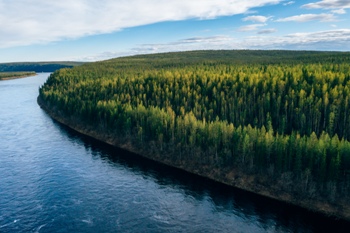Please activate JavaScript in your browser to use all interface options.
Vostsibneftegaz Awards More Than 20 Grants in Support of the Peoples of the Russian North
25 March 2021
The East Siberian Oil and Gas Company (Vostsibneftegaz), a subsidiary of Rosneft, organised a round table in Krasnoyarsk on interaction with the indigenous peoples of the Russian North. Ecologists, scientists, and representatives of local communities and Krai authorities took part in the event as experts. Oil producers summarised the results of the annual grant programme to support scientific social and environmental projects of applied importance to the company’s operating territory of the Evenki municipal district of Krasnoyarsk Krai.
The Vostsibneftegaz grant programme has been in place since 2014. During this time, the company has supported more than 20 scientific projects, including projects to study the population of wild reindeer, a bioindicator species of the Arctic zone, Siberian sable and lesser white-fronted goose, to preserve the Evenki language, to study the ecosystems of the Tungusky reserve, to develop the first Red Book of Evenkia and other projects. The implementation of the grant schemes helps save the unique natural environment, national culture, and traditional way of life and cultural authenticity of the indigenous population of Evenkia.
In 2021, Vostsibneftegaz allocated funds to develop modern construction technologies for the Surinda reindeer herding village, to establish an ethnic and ecological reserve in the Sulomai settlement, home to the Ket people area, and to assess microplastics pollution of the Lower Tunguska river.
The key goal of the Siberian Federal University project is to form a comfortable living environment in the places of ancestral residence of the indigenous peoples of the Russian North. As part of Russia’s Arctic zone development strategy, engineers will develop modern construction technologies for the Evenki reindeer herders’ village of Surinda. Innovative architectural, technological, constructive and engineering solutions are planned to be applied to the timber housing and engineering and social infrastructure facilities construction.
With urbanisation, it is increasingly difficult for aboriginal people to maintain their traditional ways of life, culture and economic activities. Biologists at the Sukachev Forest Institute, Siberian Branch of the Russian Academy of Sciences, will help solve this problem for one of the smallest northern peoples, the Kets. There are only about 1,200 people of this ethnic group in the world. The establishment of an ethnic and ecological reserve on the basis of the Evenki village of Sulomai will contribute to the preservation of the habitat and the ancestral way of life of the Kets.
Traditional crafts such as hunting and fishing are an important part of the life of the indigenous population of Evenkia. To analyse the condition of local ecosystems, ecologists from Tomsk State University will assess the quality of the aquatic environment and the condition of hydrobionts in the Podkamennaya Tunguska, the main river of the Evenki district. The presence of microplastics in a body of water far from a big city may indicate the level of pollution in the world’s oceans, scientists say.
Round table attendees commended the importance of the grant scheme of Vostsibneftegaz for the Evenki municipal region of the Krasnoyarsk Territory and for the contribution of Rosneft to the social and environmental sphere of the territory of its presence.
Note for Editors:
The East Siberian Oil and Gas Company, a subsidiary of Rosneft Oil Company, develops the Yurubcheno-Tokhomskoye oil and condensate field in the Evenki district of Krasnoyarsk Territory.
Supporting the culture and traditional way of life of the indigenous people of Evenkia is one of the key lines of the social work of the company. During the years of the work in the region, Vostsibneftegaz has implemented a lot of social, charitable and grant programmes.
Rosneft
Information Division
March 25, 2021

-315xx70.png)

